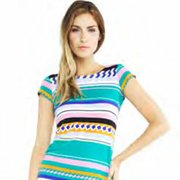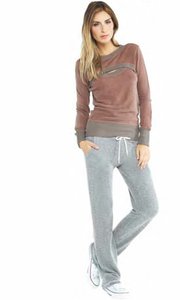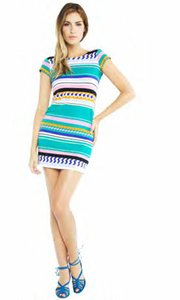Monrow: Classics Perfected, Made in L.A.
At the heart of Monrow is a killer-fitting sweatpant. Otis College of Art and Design classmates Michelle Wenke and Megan George launched Monrow’s clean, sophisticated, graphic-free knits in 2007 during the time that Juicy Couture and Free City were the reigning champions. Today the brand produces the Monrow Collection and a Classics stock program for women, men and kids.
“There is a difference when you put on a Stella McCartney blazer versus a blazer from [Santee]Alley here—that’s fit. It goes down to sweatpants,too,” said Wenke, talking about the collection in the company’s downtown headquarters. “Even a T-shirt—it’s just a T-shirt, but the armhole can be an amazing armhole, and it hangs on your body that way.”
Revolve Clothing buyer Lauren Barnes said Monrow’s “casual comfort”sweats are the iconic best sellers from the brand.
“We sell tons of sweats from Monrow in all colors and lengths—such a great piece from the brand. Their basic V-neck tees do well, too,” Barnes said.“They drape perfectly and have the softest fabric.”
The Monrow Classics program ships twice a month in 16 hue choices to give retailers consistently fresh pops of color. It’s sold at stores such as Ron Herman in Los Angeles and Japan, as well as at Curve and Piperlime.
“We launched [Classics] to beat our own drum that we have the best fleece in town. Even if buyers don’t buy the collection,we’re hoping they buy the Classics,” George said. Wholesale prices for Classics average $18–$26for cotton/modal/spandex blend tees and $40–$60for poly/cotton/rayon or loop-back French-terry sweats.
The men’s and kids’lines translate the best women’s styles into masculine and mini versions,respectively. The designers were unforgivingly perfectionist about nailing the men’s fit. George said men are “obsessed” about fit—perhaps more than women are.
“I feel like dressing men is like dressing blind people. They don’t think about it. They don’t even notice how it looks; they feel it,” Wenke said.“They’re not like, ‘Oh,this print’s cute’ or ‘I love this color on me.’ Guys are wearing it, and whatever is working, they want that times ten [shirts].”
Made in Los Angeles
Running an independently owned company and juggling the manufacturing of several collections, George and Wenke source all of Monrow’s divisions in America to retain the best quality control. The knits market is very competitive, and the founders said flawless production is imperative to staying in the game. George and Wenke design all of their own prints, develop many oft heir own fabrics and garment dye locally.
For the collection range and special collaborations (such as a special capsule collection with model Amber Valletta,named Amber Valletta for Monrow, in 2009), they keep a meticulous, watchful eye to ensure that every stitch is in its right place.
“There’s such a great workforce here and we have so many resources, there’s no reason you can’t do things here. If there’s a problem, I can get in my car, go to the factory and fix it in an hour. You have more control of your quality,”Wenke said. “At the end of the day, [brands that produce overseas]might meet their profit margins on paper, but the gap of things that can wrong widens so much more.”
With last year’s rise in cotton prices, Wenke added, it was more important than ever to run a tight,efficient ship.
“Retailers—they need lower prices, and the cotton has gone up, so you can’t pass that on to retailers and consumers or they just won’t buy your brand anymore. So, basically,the manufacturers are the ones that are stuck,” Wenke said. “Because we understand manufacturing, when we design, we can design more efficiently. That’s where we probably save—in our margin—a lot of the time.”
The fact their whole supply chain exists in the same time zone and in close proximity gives the designers more peace of mind that they are on schedule to ship on time and that the product leaving their hands is exactly what they promised to retailers. “Stores appreciate that; they know they are going to get shipped the proper garment, or if there’sa problem, they feel like there’s something they can do about it,” Wenke said.

























